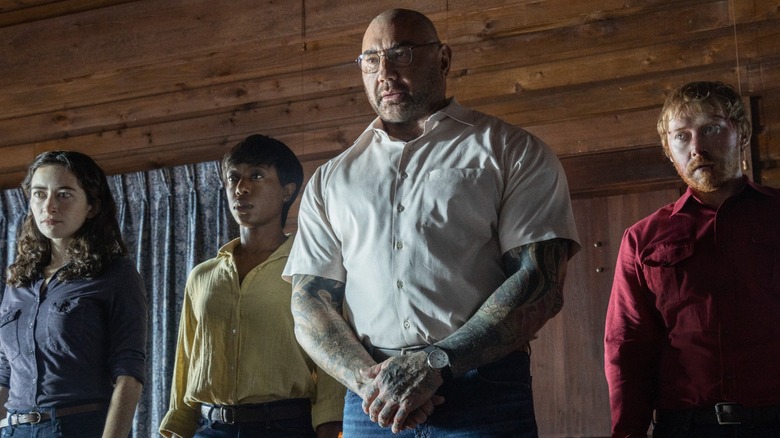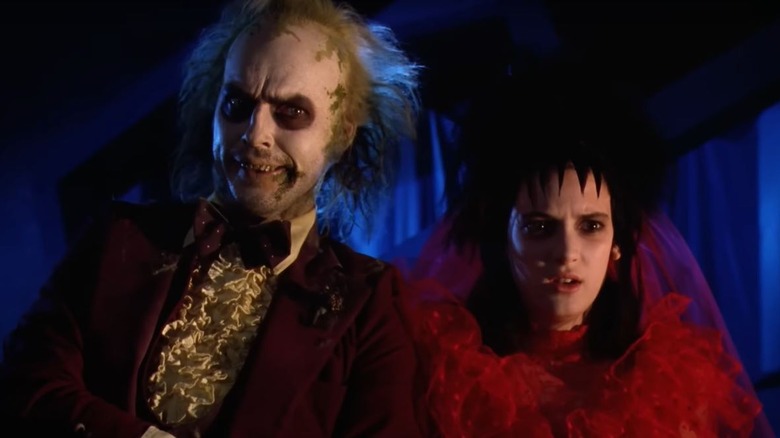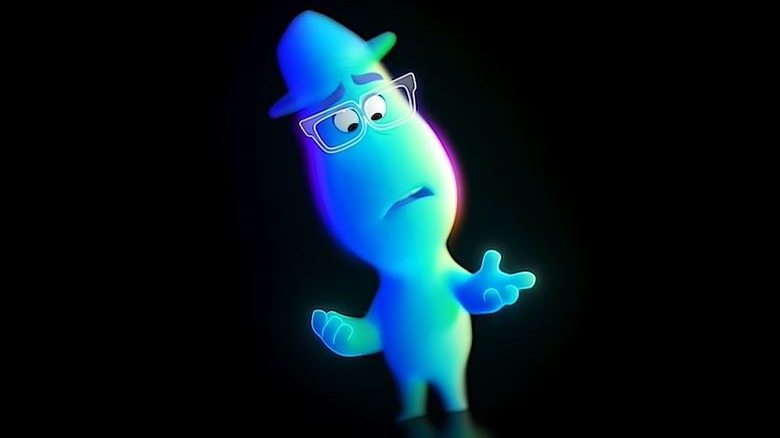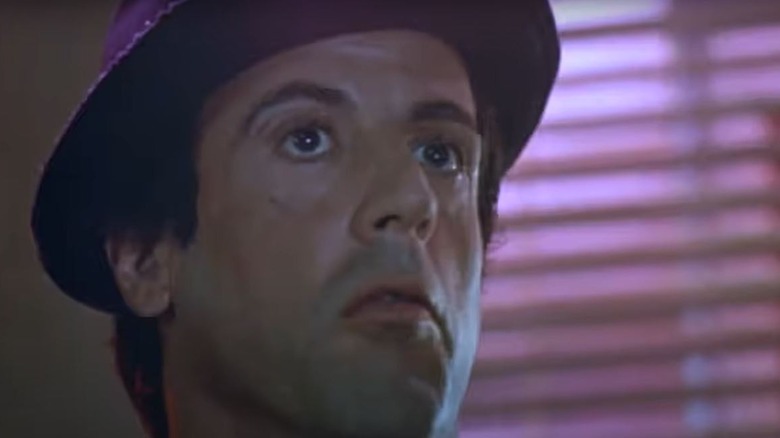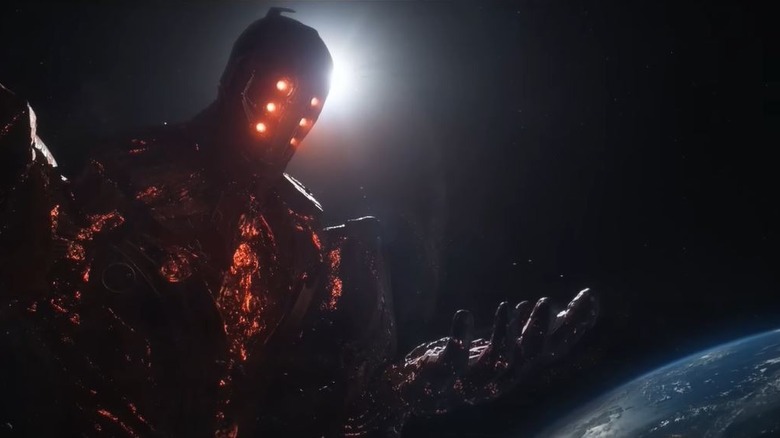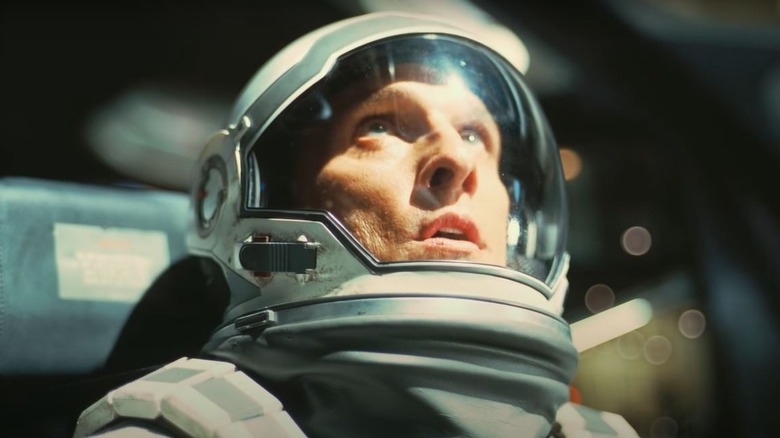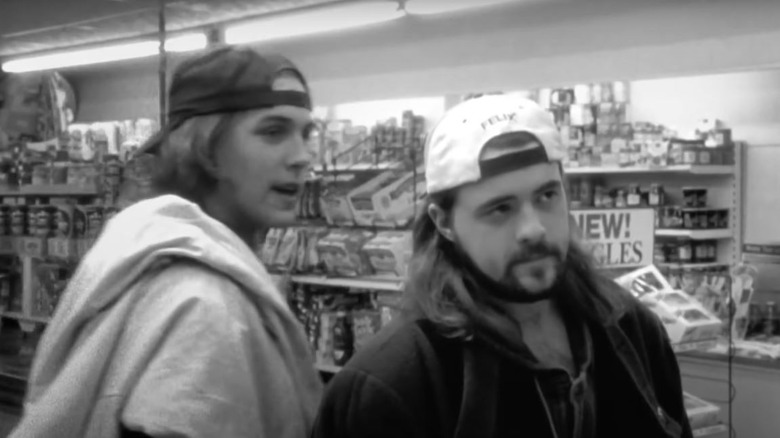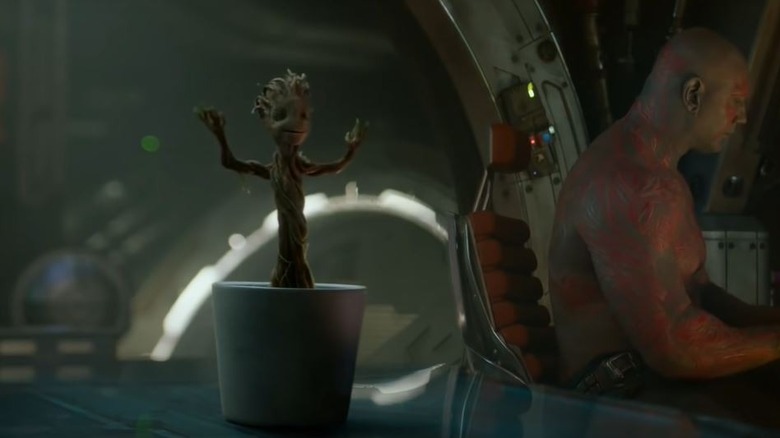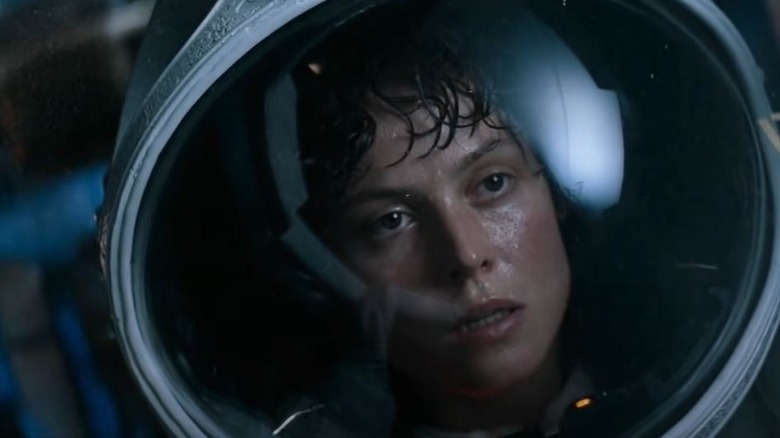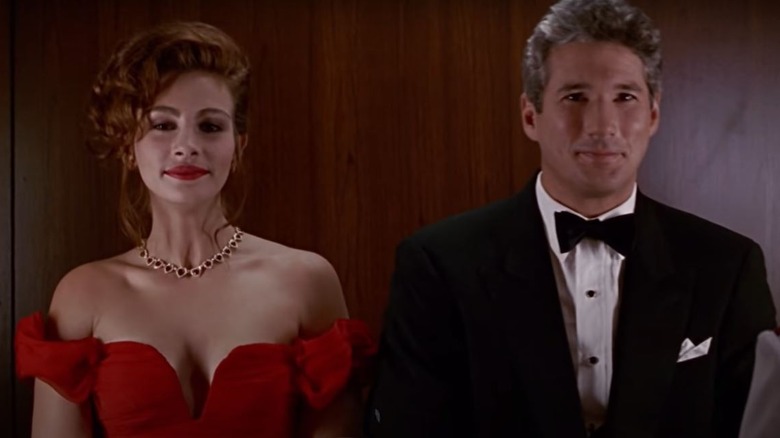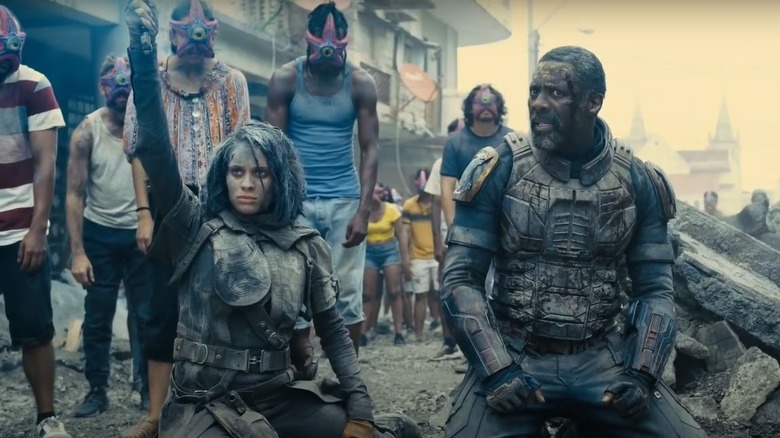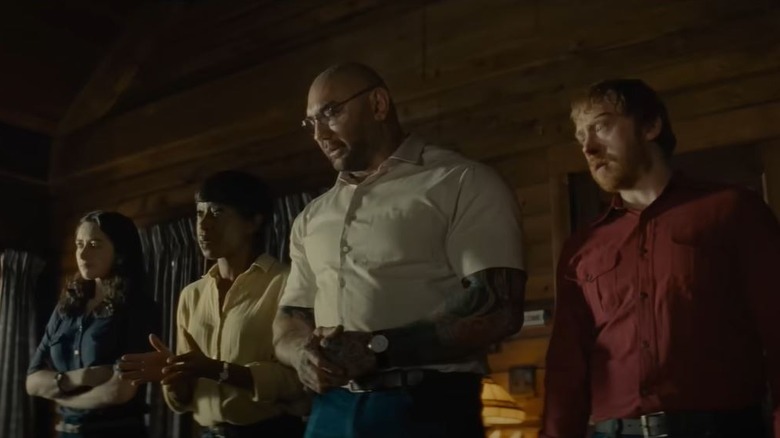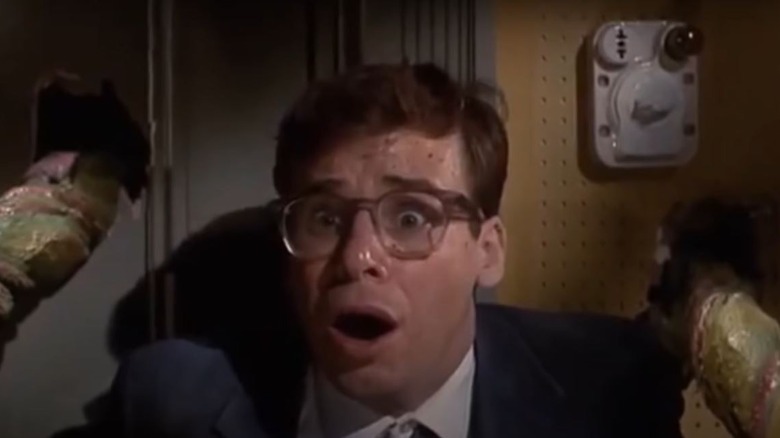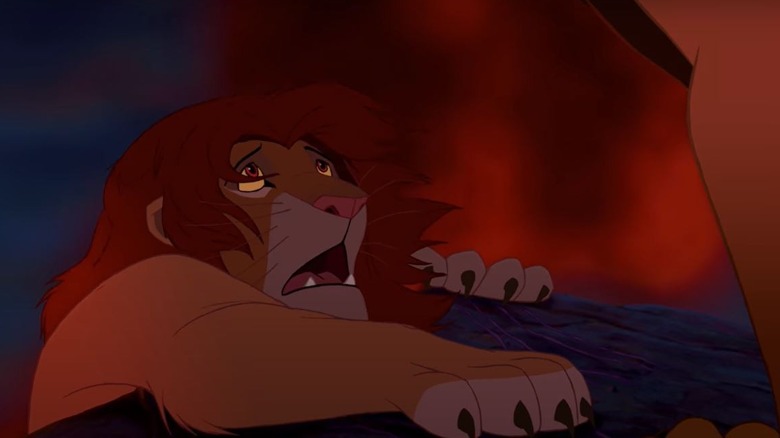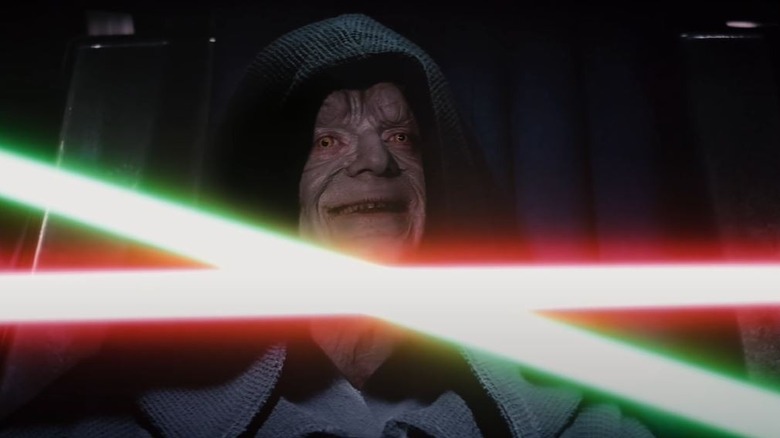The Original Endings Of These Films Were Much Darker
A movie's ending can impact its entire reception in a major way, no matter what's come before. Its' the filmmakers' last opportunity to leave an enduring impression while putting punctuation on the story. Those final moments can leave a crowd feeling a range of emotions from optimism to disbelief. Above all, a movie's conclusion should leave the viewer feeling satisfied in some way or another -– maybe with a few questions to keep them enthralled after the credits.
How a film wraps up can vary wildly depending on the theme, vision, and intention. Even the slightest alteration to the final scenes can shift how the entire film is received. Of course, there are multiple reasons why it may be necessary to adjust a movie's ending, be it low test screening scores, studio notes, real-world events affecting what seems appropriate, or simply a director who looks back over their film and realizes it's not working. In any case, a frequent issue is that an ending feels too grim, raising fears of sending an audience out on a downer note.
Continue reading to discover how some of your favorite movies were originally conceptualized to have a much darker ending. Some of the films may shock you with how differently they could have concluded, while others may have made the experience even better.
Beetlejuice
An impromptu dance-off to the song "Jump in the Line" by Harry Belafonte was an appropriately strange way to end the movie that rocket-launched Tim Burton's directorial career. "Beetlejuice" surprisingly ends on a positive note, with Lydia (Winona Ryder) and her parents deciding to coexist in the house haunted by its former owners, Barbara (Geena Davis) and Adam (Alec Baldwin). Meanwhile, Michael Keaton's Beetlejuice (aka Betelgeuse) is forced to pay his dues by spending the foreseeable future in waiting room purgatory. However, it's easy to see how the movie could have easily ended with a much darker spin.
The movie's co-writer celebrated the 30th anniversary of the film in 2018 by revealing the initial concept for wrapping up the film with Yahoo! Entertainment. "Our first ending was Lydia — she died in a fire and was able to join Barbara and Adam in the afterlife," said Larry Wilson. "A couple of people said to us, 'Do you really think that's a good idea? Is that really the message you want to be sending to the teenagers of the world? Die in a fire?' So, yeah, it probably was darker."
Understandably, the version in the finished product is a fitting end that leaves the characters open for a sequel.
Soul
Pixar went surprisingly deep for its 2020 release "Soul." The film centers around a theme that most animated children's movies desperately shy away from — namely, death. The cartoon manages to kill off its main character, jazz musician Joe Gardner (Jamie Foxx) at the beginning of the film, spiraling him through the afterlife in search of an answer to the ultimate question: What is the meaning of life? Through a series of events and guiding the young spirit 22 (Tina Fey), Joe returns to Earth with a bigger purpose and a fresh zest for life.
Unsurprisingly, there was much debate among the Pixar story team as to whether this was the right way to conclude the film. "We went back and forth on the ending up until the last screening," producer Dana Murray told ET Online. "For a long time, Joe did go to The Great Beyond."
Co-director Kemp Powers admitted there were multiple endings. "We have versions of the ending where Joe does not go back to his body, where he actually stays dead. We have versions of the ending where you see Joe on Earth a year later." Ultimately, they decided that it made sense for Joe Gardner's journey to get another chance at living his best life. However, they did have grand plans for the character in the afterlife. "He stayed and ended up being, like, the best mentor ever, and he introduced lots of new ideas to the You Seminar," Powers explained.
Rocky V
The "Rocky" franchise is built on the back of an all-American hero who triumphs regardless of the odds stacked against him. Fittingly, Sylvester Stallone has championed his Rocky Balboa character through eight movies spanning five decades. However, it was the franchise's most polarizing film, "Rocky V," that could have changed the entire direction of the boxing series.
"Rocky V" ends on the uplifting note of Balboa winning his climactic fight and coming out the hero. But according to The Independent, the original script written by Stallone had the Hollywood tough guy in tears, as he intended for his character to die in the climactic street fight. The opportunity to create a thoughtful end for the beloved character was enough to get the original "Rocky" director John G. Avildsen to reunite with Stallone for the project. Unfortunately, the studio had other plans.
"A couple of weeks into the shooting I get a call from the head of the studio," said Avildsen in an interview with CBS News. "They said, 'Oh by the way Rocky's not going to die. Batman doesn't die, Superman, James Bond, these people don't die.' So Rocky didn't die, but the movie died because that was the point." The fifth "Rocky" instalment inevitably grossed less than any other instalment in the franchise.
Eternals
When "Eternals" was released in 2021 it was a significant shake-up for the Marvel Cinematic Universe. The movie introduced a slew of new superbeings interlocked in a mythology that has implications across the entire franchise. While not every fan was won over by this team of heroes who decidedly sat out the "Infinity War" saga, their introduction changed the landscape of the MCU ... literally. The theatrical version of "Eternals" offers a darker conclusion than is standard for Marvel, with the team split on their loyalties to the Celestial Arishem.
It has since been revealed that the film's director, Chloé Zhao, had a more unified but tonally darker conclusion in mind for the cosmic super squad. "We actually had another ending that is really bleak," said Zhao in an interview with Empire. "It used to end with everybody back on the ship, minds erased and just going on to another planet, like 'The Twilight Zone.'" The final twist reportedly went too dark for test audiences. "I remember when it goes to black, everyone was like, 'I don't know what to do,'" Zhao said. "It's the MCU, and you want to be excited for what's next."
Interstellar
A groundbreaking work of modern sci-fi, Christopher Nolan's "Interstellar" boldly adapts concepts such as wormholes and time dilation into an affecting narrative. Audiences appreciated the high concepts and original plot that were a wide step from the typical Hollywood blockbuster. One element that didn't buck tradition, though, was the happy ending, which reunites Joseph Cooper (Matthew McConaughey) with his daughter Murph as they save humanity in the process. It's a standard cinematic heartfelt conclusion that seems impossible in the context of the film. Understandably, the filmmakers didn't arrive at this finale until after they'd considered a much darker ending.
"Interstellar" co-writer (and the director's younger brother) Jonathan Nolan admitted in an interview with Nerdist, "[The original ending] had the Einstein-Rosen bridge [wormhole] collapse when Cooper tries to send the data back." Without further explanation, we can assume that this ending would have assured Cooper could have never made the return journey home, as it's the wormhole that helps him come back in the finished film. Nolan also did not divulge if the data that essentially saves his daughter and all of humanity made it through in the original script either. Meaning that, in this alternate version, Cooper's mission could have been a complete failure.
Clerks
The story behind the making of "Clerks" remains an inspiring tale for young filmmakers. Writer-director Kevin Smith dropped out of film school and pulled off a movie on a budget of $27,000 about the day in the life of a convenience store clerk. Receiving instant acclaim, the small black-and-white film catapulted Smith's career, spawning a trilogy, an animated series, and a slew of connected features, including "Mallrats," "Dogma," and "Jay and Silent Bob Strike Back." Today, Kevin Smith is an icon in popular culture and cult film, all thanks to the gamble he took as an aspiring filmmaker. However, Smith's legacy may have looked drastically different had the director opted to utilize the ending he originally filmed.
As released, the movie offers an appropriate conclusion, with Randal Graves (Jeff Anderson) announcing "You're closed!" to Dante Hicks (Brian O'Halloran) as they wrap up their eventful day at the Quick Stop. But Smith actually filmed one more scene that would have changed the entire dynamic of the film. As Dante prepares to leave for the night, one more customer enters the store and makes short work of shooting and killing the clerk, subsequently emptying the cash register. The dark twist was dropped after the film's first screening, but can be found as an extra on later home video releases.
Guardians of the Galaxy
James Gunn's vision for "Guardians of the Galaxy" was a welcome injection of colorful humor in a modern science fiction landscape that has so often doubled down on grim seriousness. The first "Guardians" movie brings a ragtag group of criminals together in a battle to protect the universe, culminating in a dance-off and a unified family. Despite some family drama and high stakes, the movie is an optimistic romp through a bright universe. Still, Gunn was tempted to end the beloved Marvel feature on a gloomy note that may have left viewers feeling less positive when they left the theatres in 2014.
The finished film concludes with a montage of characters living out the conclusions of their individual arcs. However, Gunn has since revealed that three moments were shot that didn't make the final montage, including scenes with The Collector (Benicio Del Toro) and Nebula (Karen Gillan). Most notably, one featured Peter Quill's Earthbound grandfather (Gregg Henry) in a bit that could have brought down an otherwise optimistic feature. "He has this photograph of Meredith [Quill's mother] and Peter as a little boy and he looks up at the stars and we go up to the stars and it was really sweet," said Gunn at a press event covered by /Film. "It means that he must have seen Quill getting abducted at the end of that day and is still waiting for him to return. But it was freaking sad, so we took it out."
Alien
Of all the movies on this list, Ridley Scott's 1979 sci-fi horror masterpiece "Alien" is undoubtedly the darkest. The film features the death of nearly every character onboard the spaceship Nostromo as an extraterrestrial effectively picks them off one by one. The movie was a haunting experience and a huge success when it debuted in theatres, and the disturbing visual effects were enough to earn an Academy Award. Still, the notoriously scary film could have ended on an even darker note that would have changed the entire face of the franchise, which eventually spawned seven subsequent features.
It was not until decades later that Scott revealed his original plan for the alien and Ripley (Sigourney Weaver) in the final moments of the film. Famously, the finished film ends with Ripley overcoming the monster, leaving her to face the demon again in multiple sequels. However, Scott did not intend for Weaver's character to make it out alive. "I thought that the alien should come in, and Ripley harpoons it and it makes no difference, so it slams through her mask and rips her head off," the director told Entertainment Weekly (via Polygon). This terrifying conclusion would have left the alien the victor and the movie without any surviving human characters.
Pretty Woman
Arguably among the most iconic romantic comedies of all time, 1990's "Pretty Woman" catapulted Julia Roberts' career and made her one of the biggest stars in the world. Exceeding expectations and becoming a surprise box office sensation (per Statista), the film balances reliable rom-com tropes with complex themes. Roberts plays Vivian Ward, who is hired to spend a week with wealthy businessman Edward Lewis (Richard Gere). Regardless of their differences, the two develop a bond that concludes with Edward conquering his fears and committing to Vivian, sealed by a romantic fire escape embrace. As it turns out, though, the fairy tale ending was a far cry from the way the film was intended to conclude.
Instead of Gere's character climbing the ladder to love, the pair weren't even originally intended to end up together. "Pretty Woman" director Garry Marshall revealed to Vanity Fair that he wanted to make a much darker drama about the deepening financial polarization between the rich and poor. Essentially, the movie was supposed to be about the well-to-do Gere taking Vivian on an extravagant week away only to drop her off where she started. Admittedly, Marshall says it was the performers who changed the film's trajectory. "The chemistry between Julia and Gere, it is palpable on the screen, it was palpable in auditions," Marshall said. "You can't really see how it could end any other way, because they just light up with each other."
The Suicide Squad
Filmmaker James Gunn is now the co-head at DC Studios, a job he clearly earned on the strength of his previous work with the company. In 2021, Gunn spearheaded a relaunch of "The Suicide Squad" after the franchise's lackluster first attempt with 2016's "Suicide Squad," and the director's unceremonious (and short-lived) firing from Marvel. Reportedly, the director of darker films like "Slither" and "Super" was given free rein to effectively kill off any character he wished from the DC roster (via AV Club). Putting the studio to their word, "The Suicide Squad" offers a significant amount of character deaths, including more than one star player.
Surprisingly, Gunn originally wanted to take out one more of his characters, but it proved to be too dark for even him. "At the very end of the movie, Ratcatcher 2 [Daniela Melchior] had taken the information about Jotunheim ... and Waller blew up her head," Gunn admitted in an interview with Cinema Blend. Ultimately, the director opted for a slightly more optimistic conclusion. "It was really just too dark. It didn't really work for me. It didn't really tell the story that I wanted to tell, which is much more about the characters' different journeys, emotionally. And for me, really, the ending with Bloodsport [Idris Elba] petting the rat ... that, to me, was the perfect ending for the movie."
Knock at the Cabin
Director M. Night Shyamalan has made his fair share of dark psychological thrillers that keep audiences on their toes. From "The Sixth Sense" to "Signs" to "Old," he's built a reputation for major twists and eerie themes. With "Knock at the Cabin," he opted to adapt an existing novel, "The Cabin at the End of the World" by Paul G. Tremblay, instead of creating his own story from the ground up. Still, Shyamalan did take a few liberties, specifically with the ending of "Knock at the Cabin" leading to a much more optimistic conclusion than the source material.
In the film, Eric (Jonathan Groff) and Andrew (Ben Aldridge) are vacationing with their daughter in a remote cabin when a group of strangers approach with a bizarre proposal: One member of the family must sacrifice themselves in order to stave off the oncoming apocalypse. After a series of events, Eric comes around and believes the theory about the end of the world, ultimately offering up his own life. The movie ends with disaster averted and the Earth returning to normal. However, that's not how the book "The Cabin at the End of the World" concludes. Instead, neither of the two men decides to sacrifice themselves. Choosing to face the advancing apocalypse together, the supernatural storm begins to brew, insinuating everyone in the world is about to die.
Little Shop of Horrors
"Little Shop of Horrors" has grown to become an undisputed cult classic. Directed by Muppets alum Frank Oz and starring the always lovable Rick Moranis, the movie musical about a sentient destructive houseplant has continued finding its way into audience's hearts since its 1986 release. However, not only did the movie underperform in theatres, its entire release was almost in jeopardy. "We went to San Jose for the first preview, and everyone was very excited about it. This was, I think, the most expensive film Warner Bros. had done at that time," Oz recalled in an interview with Entertainment Weekly. "For every musical number, there was applause. They loved it, it was just fantastic ... until we killed our two leads."
Based on a stage musical by future Disney tunesmiths Howard Ashman and Alan Menken (who were in turn adapting a low-budget Roger Corman movie), Oz intended to conclude his movie on the same note as the source material. The film originally had a different ending that not only saw the lead characters killed by Audrey II but featured an extensive sequence of the plant and its army of cuttings taking over cities all over the world. "We had to cut that ending and make it a happy ending, or a satisfying ending," said Oz. "We didn't want to, but we understood they couldn't release it with that kind of a reaction."
Ultimately, the theatrical release has a much lighter conclusion with Moranis and his love interest Audrey (Ellen Greene) living happily ever after –- minus the budding Audrey II in their front flowerbed. The original ending, featuring nearly 20 minutes of footage that was either cut or reshot, can now be found in the optional Director's Cut on Blu-ray.
The Lion King
Even when they've dabbled in scary or bittersweet scenes, happy endings have always been an essential part of the formula for Disney's animated features. Still, 1994's "Lion King" carried some heavy themes -– Millennials are still recovering from the death of Mufasa. With the movie heavily inspired by the Shakespearean classic "Hamlet," tragedy and murder are integral to the plot. As such, the final battle between Scar and Simba was destined to have a harrowing conclusion. And the movie delivers, with Scar ultimately being devoured by his not-so-loyal gang of hyenas. And while that's pretty gruesome, the filmmakers originally planned a much darker fate for the villainous lion.
Original storyboards for the film's climax can now be found on YouTube, and it's easy to see why the action was reworked before the theatrical release. The momentous battle remains relatively unchanged until Simba is left clinging for his life begging for his uncle's empathy. Upon revealing that he was the one who caused the death of Mufasa, Scar delivers the line "Goodnight, sweet prince," lifted directly from "Hamlet." Subsequently, it's Simba who makes the tumble from Pride Rock, lucky to survive. Meanwhile, Scar is engulfed in the fire that has overtaken the scene, laughing maniacally as he burns to death.
Star Wars: Return of the Jedi
The conclusion of the original "Star Wars" trilogy needs no introduction. "Return of the Jedi" closes out the Skywalker saga (at least for many years) with hope restored to the galaxy far, far away. Given the stakes and the long journey, the final celebratory moments were designed as a rousing celebration for the franchise's devoted fanbase. But while the years since its 1983 premiere have seen several alterations to the ending via George Lucas' various "Special Edition" releases, there is one possible conclusion that fans never got to see. And thank goodness it never made the final cut, as it would have made the emotional cliffhanger of "The Empire Strikes Back" look downright cheerful.
In the early days of writing "Return of the Jedi," George Lucas met with co-writer Lawrence Kasdan to discuss the fateful end of the trilogy. According to transcripts of that meeting (per Digital Spy), Lucas had dark intentions for the fate of Luke Skywalker (Mark Hamill). After the climactic battle and the Emperor's defeat, Luke finally gets to meet his father under the mask. However, the pair briefly considered that Luke would have put on the black helmet, saying, "Now I am Vader. Now I will go and kill the [Rebel] fleet and I will rule the universe." Undeniably, this one decision could have changed the course of the entire franchise. Instead, they opted for a family-friendly affair full of teddy bear Ewoks and happy endings.
